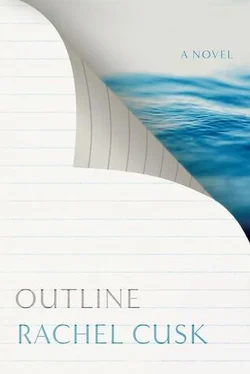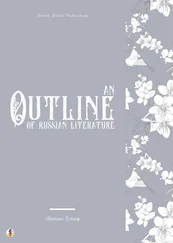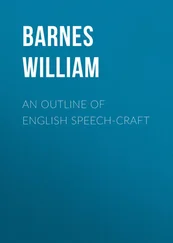At the table he sat, like the other men, with his back to the wall so that his view was of the café and the street. I sat opposite him, and because he was all I could see I looked at him. Ryan was teaching alongside me at the summer school: from a distance he was a man of conventional sandy-coloured good looks, but close up there was something uneasy in his appearance, as though he had been put together out of unrelated elements, so that the different parts of him didn’t entirely go together. He had large white teeth which he kept always a little bared and a loose body poised somewhere between muscle and fat, but his head was small and narrow, with sparse, almost colourless hair that grew in spikes back from his forehead and colourless eyelashes that were hidden for now behind dark glasses. His eyebrows, however, were fierce and straight and black. When the waitress came he took the glasses off and I saw his eyes, two small bright blue chips in slightly reddened whites. The rims were red too, as though they were sore, or as though the sun had singed them. He asked the waitress if she had non-alcoholic beer and she leaned towards him with her hand cupped around her ear, not understanding. He picked up the menu and together they studied it.
‘Are any of these beers,’ he said slowly, running a tutelary finger down the list and glancing at her frequently, ‘non-alcoholic?’
She leaned closer, scrutinising the place where his finger pointed, while his eyes fixed themselves on her face, which was young and beautiful, with long ringlets of hair on either side which she kept tucking behind her ears. Because he was pointing at something that wasn’t there her bewilderment was long-lasting, and in the end she said she would have to go and get her manager, at which point he closed the menu like a teacher finishing a lesson and said not to worry, he would just have an ordinary beer after all. This change of plan confused her further: the menu was opened again and the whole lesson repeated, and I found my attention straying to the people at other tables and out to the street, where cars passed and dogs lay in heaps of fur in the glare.
‘She served me this morning,’ Ryan said when the waitress had gone. ‘The same girl. They’re beautiful people, aren’t they? It’s a shame she didn’t have the beer, though. You can get that everywhere at home.’
He said that he was seriously trying to cut down his drinking; the past year he’d basically been on a health kick, going to the gym every day and eating salad. He’d let things slide a bit when the kids were born, and anyway it was hard to be healthy in Ireland; the whole culture of the place militated against it. In his youth in Tralee he was pretty seriously overweight, like a lot of the people there, including his parents and his older brother, who still regarded chips as one of their five a day. He’d had a number of allergies too, eczema and asthma, which no doubt weren’t helped by the family diet. As a child at school they’d had to wear shorts with knee-high woollen socks, and the socks would adhere horribly to his eczema. He still remembered peeling them off at bedtime and half the skin of his legs coming off with them. These days, of course, you’d rush your child off to a dermatologist or a homeopath, but then you were just left to get on with it. When he had breathing difficulties, his parents would put him out to sit in the car. As for the weight, he said, you rarely saw yourself with your clothes off, or anyone else without theirs for that matter. He remembered the feeling of estrangement from his own body, as it laboured in the damp, spore-ridden climate of the house; his clogged lungs and itchy skin, his veins full of sugar and fat, his wobbling flesh shrouded in uncomfortable clothing. As a teenager he was self-conscious and sedentary and avoided any physical exposure of himself. But then he spent a year in America, on a writing programme there, and had discovered that by effort of will he could make himself look completely different. There was a pool and a gym on campus, and food he had never even heard of — sprouts and wholegrains and soya — in the cafeteria; and not only that, he was surrounded by people for whom the notion of self-transformation was an article of faith. He picked it up almost overnight, the whole concept: he could decide how he wanted to be and then be it. There was no pre-ordination; that sense of the self as a destiny and a doom that had hung like a pall over his whole life could stay, he now realised, behind him in Ireland. On his first visit to the gym he saw a beautiful girl exercising on a machine while at the same time reading from a large book of philosophy that lay open on a stand in front of her, and he could hardly believe his own eyes. He discovered that all the machines in that gym had bookstands. This machine was called a step machine, and it simulated the action of walking upstairs: from then on he always used it, and always with a book open in front of him, for the image of that girl — who to his not inconsiderable disappointment he never saw again — had fixed itself in his head. Over the course of the year he must have ascended miles’ worth of stairs while remaining in one place, and that was the image he had internalised, not just of the girl but of the imaginary staircase itself, and of himself forever climbing it with a book dangled just in front of him like a carrot in front of a donkey. Climbing that staircase was the work he had to do to separate himself from the place from which he had come.
It was more than just a stroke of luck, he said, that he happened to go to America: it was the defining episode of his life, and when he thought about what he would have been and what he would have done had that episode not occurred it frightened him in a way. It was his English tutor at college who told him about the writing programme and encouraged him to apply. By the time the letter came college was over and he was back in Tralee, living in his parents’ house and working at a chicken-processing plant, and having an affair with a woman much older than himself who had two kids he didn’t doubt she’d got him lined up to play father to. The letter said that he’d been offered a scholarship, on the basis of the writing sample he’d submitted, with a paid second year to follow if he wanted to earn himself a teaching qualification. Forty-eight hours later he was gone, taking a few books and the clothes he stood up in, on an airplane and leaving the British Isles for the first time in his life, and without a clue really where he was going, except that sitting above the clouds it appeared to be heaven.
In fact it so happened, he said, that his older brother left for America at more or less the same time. He and his brother never had all that much to say to each other, and at the time he was barely aware of Kevin’s plans, but thinking about it now it was quite a coincidence, except that Kevin hadn’t had a stroke of luck to send him on his way. Instead he’d joined the US Marines, and probably at much the same time as Ryan was treading the step machine, Kevin was also shedding the flab of Tralee at boot camp. For all Ryan knew he might have been down the road, though America is a big place and it was unlikely. And of course the job involves a lot of travel, Ryan said, with apparent sincerity. By a further coincidence both brothers returned to Ireland three years later and met in their parents’ sitting room, both of them now fit and lean; Ryan with a teaching qualification, a book contract and a ballet-dancer girlfriend, and Kevin with a grotesquely tattooed body and a mental condition that meant his life would never again be his own. The imaginary staircase went down, it seemed, as well as up: Ryan and his brother were now effectively members of two different social classes, and while Ryan went off to Dublin to take up a university teaching post, Kevin returned to the damp bedroom of their childhood, where excepting the odd stay in mental institutions, he has remained ever since. The funny thing is, Ryan said, that their parents took no more pride in Ryan’s achievements than they accepted blame for Kevin’s collapse. They tried to get rid of Kevin and have him committed on a permanent basis, but he kept being sent back to them, the perennial bad penny. And yet they were also faintly scornful of Ryan, the writer and university lecturer, living now in a nice house in Dublin and about to marry, not the ballet dancer but an Irish girl, a college friend from the time before America. What Ryan had learned from this is that your failures keep returning to you, while your successes are something you always have to convince yourself of.
Читать дальше












